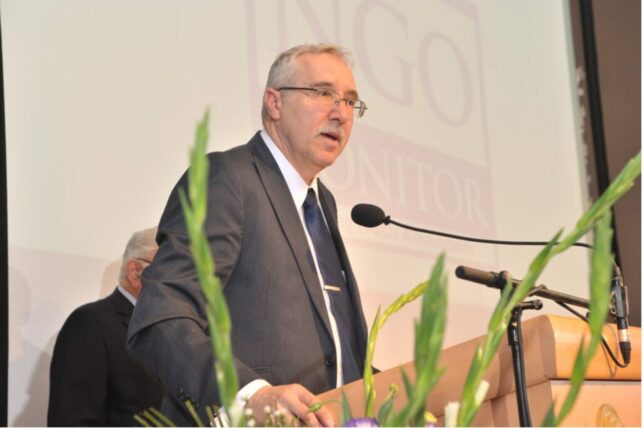Philanthropy
A Conversation with NGO Monitor’s Gerald Steinberg (Part 1 of 2)
The international-relations scholar talks with Michael E. Hartmann about anti-Israel non-governmental organizations’ political power, their fundraising skill, and their culpability for the horrific October 7 attack.
 Gerald Steinberg.
Gerald Steinberg.

Gerald Steinberg founded NGO Monitor in Jerusalem after the 2001 United Nations World Conference Against Racism in Durban, South Africa, during which a related NGO Forum of about 1,300 non-governmental organizations (NGOs) adopted a strategy of using the instruments and language of “human rights” and “international law” to isolate and undermine Israel.
A project of the Institute for NGO Research, NGO Monitor researches, publishes books and reports on, and maintains comprehensive databases tracking the government and private philanthropic funding of NGOs at work in and on issues about Israel. Most of these NGOs question and/or attack Israel’s very existence, its legitimacy, its sovereignty, its authority, and its security.
Since the horrific October 7 attack on Israel by Hamas, NGO Monitor has helpfully collected and continues to regularly update many of its resources on and related to what happened.
All funding of NGO Monitor itself is from private donors and foundations. It accepts no government support.
In addition to serving as NGO Monitor’s president, Steinberg is a professor emeritus at Bar Ilan University in Israel. He founded the university’s Program on Conflict Management and Negotiation.
He was kind enough to join me for a conversation last week. The almost 17-minute video below is the first part of our discussion; the second is here. In the first part, he talks about anti-Israel non-governmental organizations’ political power, their fundraising skill, and their culpability for the horrific October 7 attack.
In the 1990s, “as an academic doing international relations,” Steinberg tells me, “I would do things in the United Nations in Geneva and sometimes New York and other locations. I was working on nuclear non-proliferation, and I would see individuals from these organizations handing out materials to people going into meetings.”
There would be a session on disarmament at the UN in Geneva “and the Human Rights Council was in the same complex, and people would be handing out materials” accusing Israel of a long list of ostensible violations. They were from Human Rights Watch, Amnesty International, and similar groups, claiming to be were speaking on behalf of Palestinians.
“Many groups were handing out literature, submitting material, getting time to speak,” Steinberg continues. He realized how influential these organizations are.
They very much feed into the agendas of governments, of international organizations like the United Nations. What’s their responsibility? What’s the source of their authority. What allows them to do this? I realized that in the academic world, there was almost no literature on this. It was just an empty space. …
They were all described as essentially very moral, altruistic, principled, voluntary organizations and individuals, Steinberg recalls. “I began to dig into this,” he says.
“In the academic world,” he goes on, “there was no serious analysis of “the political power of NGOs and how they exercise that power. I began to do the research on that, wrote a couple of papers, and I realized how huge this industry was. … It’s a multi-billion dollar industry with no oversight, no checks and balances, completely under the horizon.”
Then, following the UN’s ’01 Durban Conference, Steinberg started NGO Monitor. There should be groups like NGO Monitor, he says, “in every single Western country that has a large NGO sector, to keep them honest, because they’re not.”
Since ’01, these groups “have probably doubled or tripled their funding,” according to Steinberg. “Ken Roth—… the executive director of Human Rights Watch for 29 years, 1993 to 2022—is a brilliant fundraiser. … That was his greatest skill. Amnesty International has a very powerful fundraising organization.”
NGO Monitor roughly estimates that anti-Israel NGOs annually allocate $200 million to this agenda alone. Roughly half of that amount comes from European governments, and the other half is from mostly American private charitable foundations and individual donors.
These grant-recipient NGOs are “basically waging soft-power warfare against Israel,” Steinberg notes. “They define themselves as human-rights promoters, also international-aid organizations.”
As for the grantmakers, “we call them funder enablers,” he says, “because if you give a lot of money or any money to an organization, you may not know very much about what they’re doing … but it doesn’t make any difference. Your money is enabling them. And you own it.”
All the donor agencies, including the UN, “that are active in Gaza know exactly what’s going on and they’re definitely culpable, they’re complicit in the terrible, indescribable murders that we saw just a few weeks ago” in Israel.
In the conversation’s second part, Steinberg talks about those who fund the anti-Israel NGOs his organization monitors, most prominently including the Rockefeller Brothers Fund, and how private givers and public policymakers could and should consider reacting to the October 7 attack and its aftermath.
This article originally appeared in the Giving Review on October 30, 2023.


